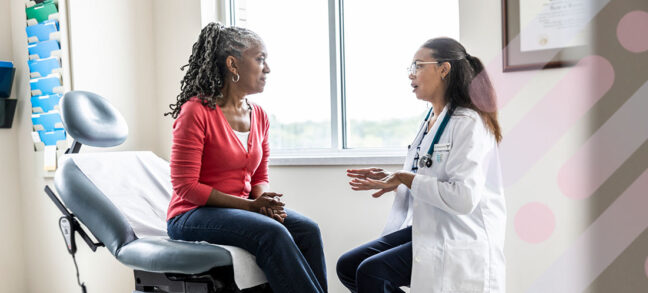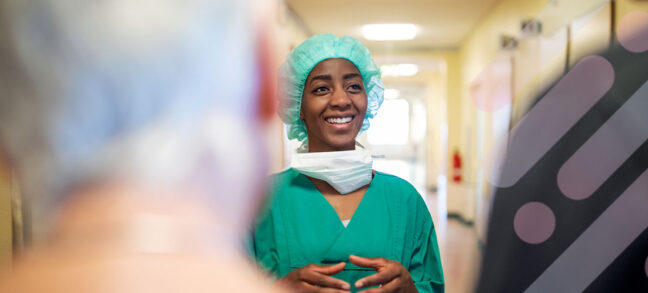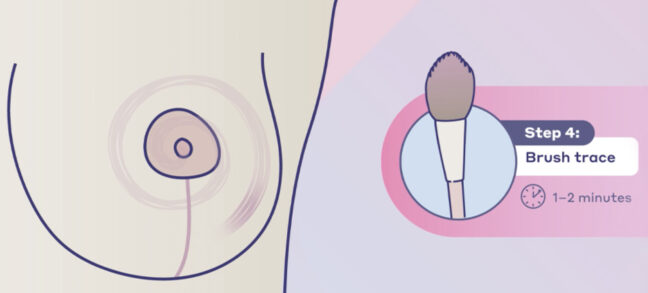For many women with breast cancer, their diagnosis can leave them feeling helpless and confused.1 They likely have more questions than answers. What does this diagnosis mean for me? For my family? What can I expect from my treatment? What happens after treatment? Should I get reconstructive surgery? Every phase of the journey seems to bring with it a new set of questions.
While your doctor will have many of the answers, some women find it helpful to seek out information from other sources, including friends and family, books, magazines and websites.2 These sources can help you feel more empowered and even foster a better relationship between you and your team of doctors.3,4
That being said, there are a number of studies that suggest misinformation spreads more quickly than the truth across channels like Twitter.5 With this in mind, it’s important to have a plan around the types of information you need and where you find it before you put your trust in any source.
understand the purpose
From online forums to memoirs, there is no shortage of breast cancer information available in print, digitally or in-person. Each serves a different purpose and comes with its own set of expectations. Once you know the intended purpose of the information, you can understand where it fits within your own breast cancer education journey and vet it through the appropriate lens.
Peer-Reviewed Medical Journal Articles
Written and reviewed by medical experts, these articles are used to share research findings and insights with other medical professionals and can help guide physicians in their work.6, 7 If you’re a patient, the depth of these articles may be overwhelming. However, you can use them as a benchmark as you review patient resources. The more reliable ones will likely cite these peer-reviewed sources in their own articles.
Clinical Literature
After diagnosis and into recovery, your care team will likely provide you with pamphlets, booklets and patient education websites. These pieces can serve as the basis for your breast cancer education.
Patient Print and Online Publications
Publications like Breast Cancer Wellness, Cancer Today and a myriad of women’s magazines contain everything from inspirational personal journeys to wellness tips to research coverage. They can be a good starting point when it comes to understanding new treatment developments, the impact of a diagnosis and reconstruction options. Keep in mind, however, many only scratch the surface of the information and not all use reliable resources as a basis for their articles.8
Breast Cancer Organization Materials and Websites
Much like print and online publications, nonprofit organizations devoted to researching breast cancer and helping women understand prevention, screening and treatment can be a good starting point in your breast cancer education.
Thriver Blogs and Memoirs
Often centered on personal stories of survival, blogs and memoirs capture the breast cancer experience, helping you understand and cope with your own journey. They can also help women better understand their risk when covering information from medical experts.9
Social Media and Support Communities
Online, phone and in-person support communities can also be an abundant source of personal stories of fighting, healing and thriving, which can help you cope with your own diagnosis.10 Because there is little oversight in these communities, however, they should be seen as a source of inspiration rather than information.
Criteria to Consider
Whether you’re reading an online article about a new breast cancer treatment or a memoir from a celebrity thriver, you should vet the source carefully. There are a few criteria to consider that can help you determine whether or not the information is trustworthy.
Who is creating the content?
Knowing who is creating the content can help you determine how reliable it is. Information coming from a governmental organization, educational institution, hospital or advocacy group is likely going to be more reliable than a commercial business or an individual outside of the medical field. The latter can still provide helpful information, but you’ll want to view these sources through a more critical lens. If you can’t find any details about the organization or even discern who is behind the article, book, forum, etc., you may want to steer clear.
What sources are they citing?
There should be alignment between the purpose of the content and the sources. Inspirational and supportive content based on personal experience likely won’t cite additional sources outside of the author’s own journey. But if they’re offering up medical, wellness or treatment advice, you’ll want to make sure they’re citing peer-reviewed sources. Be wary of any site that uses data points or makes health claims without including citations.
What does the editorial process look like?
Some publications and organizations post their editorial review policies and processes online. This can give you a little background on how the content is created and who is reviewing it and their level of expertise.
How old is the information?
Every day, there are new advancements and discoveries in the world of breast cancer and post-mastectomy reconstruction. If you’re coming across claims and medical advice that’s more than a few years old, you may want to cross reference the information with a more up-to-date source.
Has the organization been certified?
A non-profit dedicated to ensuring patients and families have access to reliable, transparent health information on the web, Health On the Net assesses and certifies thousands of online resources. While their seal doesn’t guarantee the information is 100% reliable, it does demonstrate a dedication to creating trustworthy content.
Discuss with Your Doctor
Regardless of where you’re getting your breast cancer information, you should verify what you’ve learned with your doctor before making any decisions that may impact your health. They can help you interpret what you’ve learned and explain what it means in terms of your diagnosis and road to recovery. Ultimately, your breast cancer education should be about empowering you to have meaningful, productive conversations with your care team, so you get the treatment and post-recovery life that’s right for you.
1 Lisa Beatty B Psych (Hons), Melissa Oxlad M Psych. The psychosocial concerns and needs of women recently diagnosed with breast cancer: a qualitative study of patient, nurse and volunteer perspectives. Blackwell Publishing Ltd Health Expectations,11, pp.331–34 doi: 10.1111/j.1369-7625.2008.00512.
2 Masoomeh Latifi, Hatav Ghasemi Tehrani,1. Using information sources by breast cancer women treated with mastectomy. Published online 2019 Mar 14. doi: 10.4103/jehp.jehp_224_18
3Fariba Taleghani, Masoud Bahrami. Empowerment Needs of Women With Breast Cancer: A Qualitative Study. Published online 2014 Nov 15. doi: 10.5812/ircmj.16379
4 Sharon Swee-Lin Tan1*, BSc (Hons), MSc, PhD. Internet Health Information Seeking and the Patient-Physician Relationship: A Systematic Review. Journal of Medical Internet Research. Published on 19.01.17 in Vol 19, No 1 (2017): January.
5 Caulfield Timothy, Marcon, Alessandro. Health Misinformation and the Power of Narrative Messaging in the Public Sphere. Canadian Journal of Bioethics Published on May 24, 2019. Vol 2 No 2 (2019): Open Issue
6 Jacalyn Kelly, Tara Sadeghieh. Peer Review in Scientific Publications: Benefits, Critiques, & A Survival Guide. Published online 2014 Oct 24.
7 Stephen Garba, Adamu Ahmed. Proliferations of Scientific Medical Journals: A Burden or A Blessing. Published online 2013 Nov 25. doi: 10.4082/kjfm.2013.34.6.372
8 Ajay Aggarwal, Rekha Batura. The media and cancer: education or entertainment? An ethnographic study of European cancer journalists. Published online 2014 Apr 17. doi: 10.3332/ecancer.2014.423
9 Kevin Wright, PhD; Carla Fisher, PhD Partnering With Mommy Bloggers to Disseminate Breast Cancer Risk Information: Social Media Intervention. Journal of Medical Internet Research. Published on 07.03.19 in Vol 21, No 3 (2019): March
10 Wen Kunang- Yi, McTavish Fiona. From Diagnosis to Death: A Case Study of Coping With Breast Cancer as Seen Through Online Discussion Group Messages. Published online 2011 Jan 13. doi: 10.1111/j.1083-6101.2011.01542.x
Resensation Articles

How does mastectomy impact the nerves in the breast?
One sometimes overlooked aspect of mastectomy is its impact on nerves. Read what happens to nerves during mastectomy and explore…
Read More
What happens during implant breast reconstruction with Resensation®?
By repairing sensory nerves, Resensation® enables you to potentially regain sensation to your chest. Read how this procedure works during…
Read More
how resensation® helped Leanna feel secure in her family’s future
With Resensation®, Leanna can be there to watch her kids grow up—without losing the feeling of being whole.
Read More
post-surgery sensory retraining: instructions and video guide
Sensory retraining is a series of exercises designed to help you reconnect with your body after breast reconstruction with Resensation®.
Read More